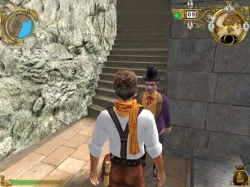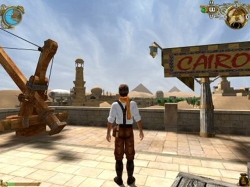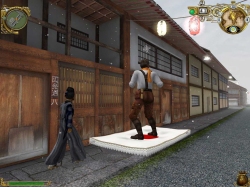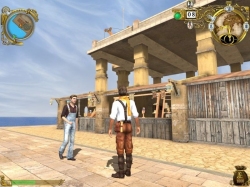|
80 Days
 Lest you be unaware, the 80 Days we are talking about here is the around the world variety, and "inspired by" the Jules Verne tale would be the most accurate way to describe it. You do go around the world, you do have 80 days, and some protagonists are familiar, but much of the plot, and the adventures along the way are new. So having sailed, and floated, and ridden, and driven from London to Bombay to Yokahama, then to San Francisco and back to London, what to make of this adventure quest?
I will get the big grumble out of the way first, and I don't think it's just my personal quirk. The game automatically saves when you reach particular points in the game, and no other saving is allowed. Although these automatic save points are reasonably plentiful, they aren't your own, and you don't get any of your own. It doesn't even autosave when you exit, so unless you stop playing immediately after a save point you will have to replay any progress from the last save point the next time you play. I want to save when I want to save, I want to stop playing when it suits me, and no PC game should make me do it any other way. The manual says the saves are automatic because "we are nice like that". Let me say "no you aren't". Bah humbug to save systems like this.
However in between the autosaves what you get with 80 Days is a jaunty, cheesy romp, complete with kilt salesmen, production numbers, elephant rides, vampires, and bad jokes. Plus a completely proper desire not to upset the workers' unions. Lest you be unaware, the 80 Days we are talking about here is the around the world variety, and "inspired by" the Jules Verne tale would be the most accurate way to describe it. You do go around the world, you do have 80 days, and some protagonists are familiar, but much of the plot, and the adventures along the way are new. So having sailed, and floated, and ridden, and driven from London to Bombay to Yokahama, then to San Francisco and back to London, what to make of this adventure quest?
I will get the big grumble out of the way first, and I don't think it's just my personal quirk. The game automatically saves when you reach particular points in the game, and no other saving is allowed. Although these automatic save points are reasonably plentiful, they aren't your own, and you don't get any of your own. It doesn't even autosave when you exit, so unless you stop playing immediately after a save point you will have to replay any progress from the last save point the next time you play. I want to save when I want to save, I want to stop playing when it suits me, and no PC game should make me do it any other way. The manual says the saves are automatic because "we are nice like that". Let me say "no you aren't". Bah humbug to save systems like this.
However in between the autosaves what you get with 80 Days is a jaunty, cheesy romp, complete with kilt salesmen, production numbers, elephant rides, vampires, and bad jokes. Plus a completely proper desire not to upset the workers' unions.
 So too is the game world, though not as big, but it will take you a decent while to get around it. Not too long though, cos time is ticking. The little chronometer in the top right corner marks the passing days, and it's not called 80 Days for nothing. Don't think you are getting 81!
Well, not unless you play in Tourist mode, the lowest of the three settings. This suspends the gradual passing of time, and although days still click over at certain points, the "timed" aspect of the game is not operative. Plus you will find loads more money strewn around the place, which will help you cope with things along the way. The other two settings have faster time and less money. Other aspects of the game, including the puzzles, are not affected.
As well as the passage of time Oliver, our globetrotting character, gets tired and needs to eat and rest. A little bar in the bottom left corner of the screen shows his energy, and you can keep it from depleting by eating or sleeping. This generally involves money, which you find in the game world and receive from your Uncle at whose behest you are travelling. A hotel room offers the best recuperation; you can "sleep rough" for free, but you will only restore half your energy, and time will still have passed.
Time passes in realtime 3D and I do like realtime worlds. It isn't brand new, but it is still well and truly the exception with an adventure game, and it's nicely done here. I was particularly impressed the first time it rained, and could almost feel the damp of the resulting mist. Characters abound, as do the lively sights and sounds of the various cities. You can talk to most of the characters, but other than the main ones in each location they have very little to say, and it gets repetitive.
The cities in particular are big places and fairly elaborate, and are worth exploring just to look around; except of course for the time element. So play Tourist if you want a more traditional adventure outing.
You use the keyboard to get around and can map the keys to suit yourself. You can use the mouse for steering, and to activate hotpoints and the inventory. So too is the game world, though not as big, but it will take you a decent while to get around it. Not too long though, cos time is ticking. The little chronometer in the top right corner marks the passing days, and it's not called 80 Days for nothing. Don't think you are getting 81!
Well, not unless you play in Tourist mode, the lowest of the three settings. This suspends the gradual passing of time, and although days still click over at certain points, the "timed" aspect of the game is not operative. Plus you will find loads more money strewn around the place, which will help you cope with things along the way. The other two settings have faster time and less money. Other aspects of the game, including the puzzles, are not affected.
As well as the passage of time Oliver, our globetrotting character, gets tired and needs to eat and rest. A little bar in the bottom left corner of the screen shows his energy, and you can keep it from depleting by eating or sleeping. This generally involves money, which you find in the game world and receive from your Uncle at whose behest you are travelling. A hotel room offers the best recuperation; you can "sleep rough" for free, but you will only restore half your energy, and time will still have passed.
Time passes in realtime 3D and I do like realtime worlds. It isn't brand new, but it is still well and truly the exception with an adventure game, and it's nicely done here. I was particularly impressed the first time it rained, and could almost feel the damp of the resulting mist. Characters abound, as do the lively sights and sounds of the various cities. You can talk to most of the characters, but other than the main ones in each location they have very little to say, and it gets repetitive.
The cities in particular are big places and fairly elaborate, and are worth exploring just to look around; except of course for the time element. So play Tourist if you want a more traditional adventure outing.
You use the keyboard to get around and can map the keys to suit yourself. You can use the mouse for steering, and to activate hotpoints and the inventory.
 There are quite a few puzzles and conundrums in 80 Days, from the simple "fetch and carry" to the more difficult and involved. Some have action elements, and depending upon how you react to a little action you will find them not too difficult or, possibly, a frustrating pain. But there aren't that many. With the more elaborate puzzles, I don't recall feeling lost for a clue, and whilst some required a little fiddling to discover the mechanics, the clues were there for the objective. Some were straight trial and error, a little lazy I thought, but there weren't too many of these, and some were repeated one time too many. I did take a few notes and made a few drawings (thankfully with respect to a maze like sequence). Many are a tad fanciful, but so is much of the game, so it would be unfair to quibble about this.
It is pretty much one thing at a time, which is a shame, but probably makes the time passing easier to handle if you aren't playing on Tourist. Each objective appears briefly on screen and can be brought up again using the tab key.
One conundrum you will rarely encounter, though, is where to go next. A nifty map in the top left of screen shows the direction of your "live" objectives, and colours indicate whether they are below or above you (eg a different deck on a ship). Getting to them might not be quite as easy as it sounds; navigating around the boat, for instance, took a little bit of exploration to work out how to access different parts and levels. But if you have to go to the captain's cabin, you need not wander aimlessly hoping to find it or him. The map will guide you.
At times this made some parts of 80 Days a little like painting by numbers, but as I mentioned it isn't always simple. And I can't abide aimlessly wandering around hoping to discover something has changed, or questioning every character in order to hit the one with the relevant information. ("The captain? He is in room 303"). So the map was a definite plus.
The Guild for the Promotion and Acceptance of the Kilt, however, will be a matter of taste. As will much of the corny humour in the game. And the production numbers, and Oliver's little happy dance when he finds money. I said it was cheesy and it is. I confess that "Run Like a Hero" to the tune of "Walk Like an Egyptian" was almost worth playing the game for. Not everything hit its mark, but wry smirks and chuckles were certainly prevalent throughout. The little announcement telling you the zeppelin is delayed should tickle any traveller. There are also plenty of digs at itself and references to other Frogwares titles.
I thought the desktop was particularly well managed. With the inventory open there were a lot of things on screen, but it didn't seem cluttered and conveyed what was necessary easily and clearly. There are quite a few puzzles and conundrums in 80 Days, from the simple "fetch and carry" to the more difficult and involved. Some have action elements, and depending upon how you react to a little action you will find them not too difficult or, possibly, a frustrating pain. But there aren't that many. With the more elaborate puzzles, I don't recall feeling lost for a clue, and whilst some required a little fiddling to discover the mechanics, the clues were there for the objective. Some were straight trial and error, a little lazy I thought, but there weren't too many of these, and some were repeated one time too many. I did take a few notes and made a few drawings (thankfully with respect to a maze like sequence). Many are a tad fanciful, but so is much of the game, so it would be unfair to quibble about this.
It is pretty much one thing at a time, which is a shame, but probably makes the time passing easier to handle if you aren't playing on Tourist. Each objective appears briefly on screen and can be brought up again using the tab key.
One conundrum you will rarely encounter, though, is where to go next. A nifty map in the top left of screen shows the direction of your "live" objectives, and colours indicate whether they are below or above you (eg a different deck on a ship). Getting to them might not be quite as easy as it sounds; navigating around the boat, for instance, took a little bit of exploration to work out how to access different parts and levels. But if you have to go to the captain's cabin, you need not wander aimlessly hoping to find it or him. The map will guide you.
At times this made some parts of 80 Days a little like painting by numbers, but as I mentioned it isn't always simple. And I can't abide aimlessly wandering around hoping to discover something has changed, or questioning every character in order to hit the one with the relevant information. ("The captain? He is in room 303"). So the map was a definite plus.
The Guild for the Promotion and Acceptance of the Kilt, however, will be a matter of taste. As will much of the corny humour in the game. And the production numbers, and Oliver's little happy dance when he finds money. I said it was cheesy and it is. I confess that "Run Like a Hero" to the tune of "Walk Like an Egyptian" was almost worth playing the game for. Not everything hit its mark, but wry smirks and chuckles were certainly prevalent throughout. The little announcement telling you the zeppelin is delayed should tickle any traveller. There are also plenty of digs at itself and references to other Frogwares titles.
I thought the desktop was particularly well managed. With the inventory open there were a lot of things on screen, but it didn't seem cluttered and conveyed what was necessary easily and clearly.
 The transport in 80 Days has a part to play as well. When travelling between cities, the various modes of transportation are like locations in themselves, all of which have problems which Oliver will have to overcome. Within the cities there are various modes of transport which you can utilise to get you around a little faster to save time. Or just because they are fun. The flying carpet and the sports car were favourites of mine.
Dialogue is subtitled by default and at times there can be a fair bit of it. There are quite a few cutscenes along the way, which I enjoyed, and the graphics are high calibre. I guess they would want to be when you look at the system specifications, but the 3D realtime world would account for a bit of the needed grunt.
The plot goes off all over the place, and I did feel a little lost at times as to what was going on in the main thread, but it wasn't a problem. It got back on track or I picked it up later. The voice acting was varied, and Oliver needed to slow down. He was talking as fast as he was running.
Hotspots in 80 Days light up a vibrant green when you are close enough, although some are particularly finicky about where Oliver needs to stand in order for them to register. This caused a fair bit of frustration in one puzzle in particular, so much so I went back to an earlier save point and went somewhere else. So too there were times when I couldn't get Oliver to go somewhere he was clearly supposed to be able to go; only by fiddling excessively with his orientation would he move forward. Of course, I assumed at first he couldn't go there at all, and only a walkthrough when all else failed revealed that he was indeed supposed to be able to access a particular area.
There are also incredibly long loads between scenes. So long, that if I hadn't been forewarned I would have assumed there was a problem.
Which brings me to my other main grumble, and that is the number of annoying glitches I encountered. I downloaded a patch which is available before starting to play, so I shudder to think what the pre-patched version would have been like. I had "failed mission" messages on screen that wouldn't go away (and I hadn't failed at all), "blue screen" cabin doors, Oliver hanging in mid-air unable to let go of a rope, the occasional lock-up, and map screens failing to load. I re-mapped the walk and run keys (the default is awkward) and then Oliver wouldn't jump whilst running; I put it back the way it was and it was fine. I lost the first few words of numerous sentences, and sometimes "clicking" would fast forward a speech I had heard and sometimes it wouldn't. Never fatal, but not at all fun.
Without the irritants 80 Days would have been a 4 star game. It has a good sense of fun and is a little different from your average adventure game. A little more attention to the production values and it could have been a real winner. Nonetheless there is a lot to like and a lot of enjoyment to be had. The transport in 80 Days has a part to play as well. When travelling between cities, the various modes of transportation are like locations in themselves, all of which have problems which Oliver will have to overcome. Within the cities there are various modes of transport which you can utilise to get you around a little faster to save time. Or just because they are fun. The flying carpet and the sports car were favourites of mine.
Dialogue is subtitled by default and at times there can be a fair bit of it. There are quite a few cutscenes along the way, which I enjoyed, and the graphics are high calibre. I guess they would want to be when you look at the system specifications, but the 3D realtime world would account for a bit of the needed grunt.
The plot goes off all over the place, and I did feel a little lost at times as to what was going on in the main thread, but it wasn't a problem. It got back on track or I picked it up later. The voice acting was varied, and Oliver needed to slow down. He was talking as fast as he was running.
Hotspots in 80 Days light up a vibrant green when you are close enough, although some are particularly finicky about where Oliver needs to stand in order for them to register. This caused a fair bit of frustration in one puzzle in particular, so much so I went back to an earlier save point and went somewhere else. So too there were times when I couldn't get Oliver to go somewhere he was clearly supposed to be able to go; only by fiddling excessively with his orientation would he move forward. Of course, I assumed at first he couldn't go there at all, and only a walkthrough when all else failed revealed that he was indeed supposed to be able to access a particular area.
There are also incredibly long loads between scenes. So long, that if I hadn't been forewarned I would have assumed there was a problem.
Which brings me to my other main grumble, and that is the number of annoying glitches I encountered. I downloaded a patch which is available before starting to play, so I shudder to think what the pre-patched version would have been like. I had "failed mission" messages on screen that wouldn't go away (and I hadn't failed at all), "blue screen" cabin doors, Oliver hanging in mid-air unable to let go of a rope, the occasional lock-up, and map screens failing to load. I re-mapped the walk and run keys (the default is awkward) and then Oliver wouldn't jump whilst running; I put it back the way it was and it was fine. I lost the first few words of numerous sentences, and sometimes "clicking" would fast forward a speech I had heard and sometimes it wouldn't. Never fatal, but not at all fun.
Without the irritants 80 Days would have been a 4 star game. It has a good sense of fun and is a little different from your average adventure game. A little more attention to the production values and it could have been a real winner. Nonetheless there is a lot to like and a lot of enjoyment to be had.
Copyright © Steve Ramsey 2006.
All rights reserved.
System Requirements:
Windows 2000/XP (only), Pentium 1 GHz and AMD Athlon, 512MB RAM, 64 MB DirectX 9-compliant video card, DirectX 9-compliant sound card, DirectX 9 or higher (included on disc), 8x CD-ROM, 2 GB free hard drive space, Windows-compatible keyboard and mouse
|
